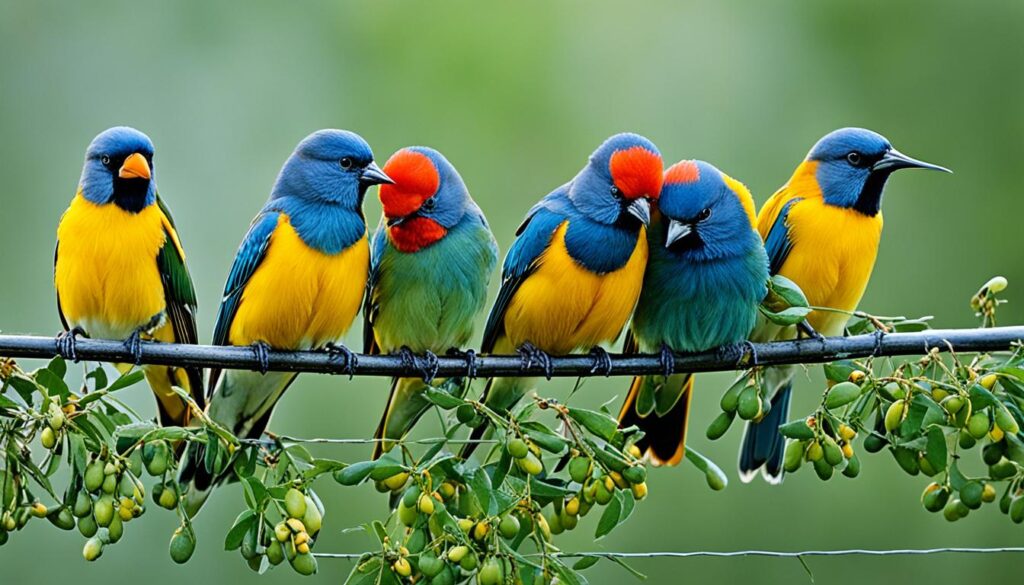As the sun rose over the lush, verdant landscape, a chorus of birdsong filled the air. Among the feathered residents of this vibrant ecosystem were a group of unexpected allies in the fight against a common scourge – ticks. These tiny arachnids can transmit dangerous diseases like Lyme disease, Rocky Mountain spotted fever, and tularemia. They pose a serious threat to both humans and animals.
Nature has its own way of keeping these pests in check. A diverse array of bird species is key. From the industrious guinea fowl to the foraging wild turkeys, these birds play a vital role in controlling tick populations. Their unique feeding habits and adaptations make them formidable allies in the battle against these unwelcome parasites.
Key Takeaways
- Certain bird species, such as guinea fowl, wild turkeys, chickens, robins, thrushes, wrens, and woodpeckers, are known to feed on ticks, helping to manage tick populations.
- Birds’ natural tick-eating habits can contribute to reducing the spread of dangerous tick-borne diseases like Lyme disease, Rocky Mountain spotted fever, and tularemia.
- Understanding the role of tick-eating birds in natural pest control can help homeowners and gardeners implement effective, eco-friendly strategies to combat ticks in their yards.
- Welcoming these avian predators into your backyard by creating a bird-friendly environment can be a sustainable and cost-effective way to control ticks without relying on harsh chemicals.
- Integrating various tick control methods, including utilizing tick-repelling plants and discouraging tick-carrying wildlife, can create a comprehensive and holistic approach to managing these pests.
Introduction to Birds and Tick Control
Birds are our allies in fighting ticks and diseases they carry. These birds help keep our backyards safe and healthy. They are key to controlling ticks naturally and safely.
The Importance of Natural Tick Control
Ticks are a big health problem, spreading diseases to humans and animals. Chemical pesticides can harm the environment and other animals. Natural tick control methods, like using birds that eat ticks, are better for our planet.
Ticks and Tick-Borne Diseases: A Growing Concern
In the U.S., 300,000 to 400,000 people get Lyme disease every year. Deer ticks are the main culprits. These ticks can stay on hosts for up to 10 days, raising the risk of getting sick. We need a strong plan to fight this, and birds are a big part of it.
“Birds are a natural and effective way to control ticks in your backyard, helping to maintain a healthy ecosystem while reducing the risk of tick-borne diseases.”
Birds That Commonly Eat Ticks
Many bird species eat ticks, helping to keep their numbers in check. Guinea fowl and wild turkeys are great at eating ticks. They are key to keeping these pests under control.
Guinea Fowl: Voracious Tick Eaters
Guinea fowl are famous for eating lots of ticks. They are often raised on farms for this reason. A single guinea fowl can eat hundreds of ticks every day.
Wild Turkeys and Their Foraging Habits
Wild turkeys also help control tick populations. They eat up to 200 ticks daily while looking for food. Their ground-foraging skills help them find and eat ticks effectively.
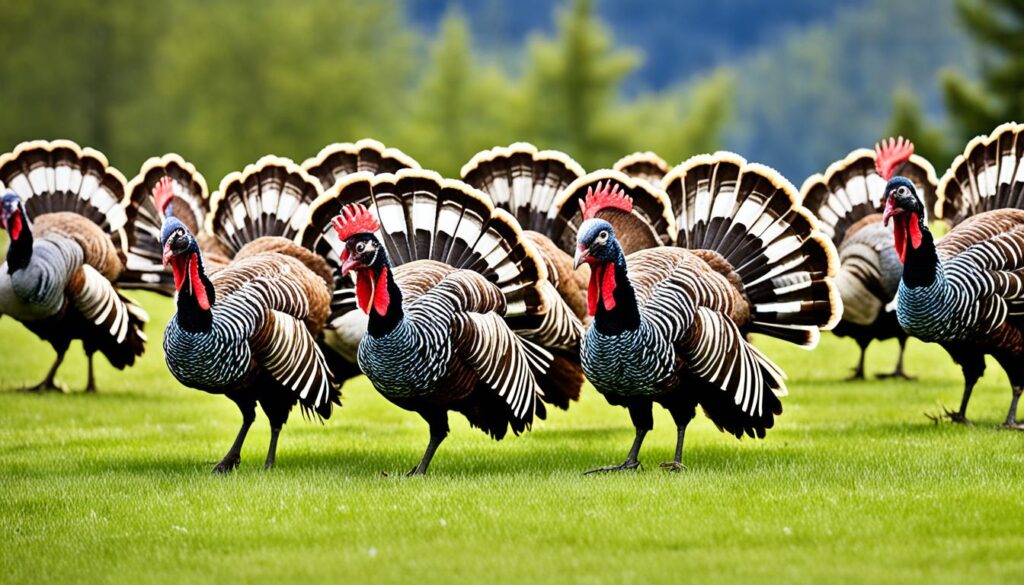
Knowing how these birds eat ticks can help us attract them. This can reduce the need for harmful pesticides. It’s a natural way to control ticks.
Backyard Birds That Help Control Ticks
Some backyard birds are great at fighting ticks. Robins and thrushes are two examples. They eat ticks while looking for food in the ground.
Robins and Thrushes: Ground Foragers
Robins and thrushes, like the American robin and wood thrush, are good at finding and eating ticks. They use their sharp eyes and quick moves to catch ticks. This helps keep ticks away from your home.
By making your yard friendly for these birds, you can use their help to control ticks. Offer them food, water, and places to hide. This will draw in different birds that also eat ticks.
“Robins and thrushes are among the most effective backyard birds at controlling tick populations, as their ground-foraging behavior allows them to target these pests where they are most common.”
Adding birds that eat ticks to your yard helps keep your area safe from diseases like Lyme disease. This method is better than using harmful chemicals. It makes your yard healthier and more sustainable.
Encouraging Tick-Eating Birds in Your Yard
Welcoming tick-eating birds to your yard helps control pests naturally. By making your yard bird-friendly and skipping pesticides, you’ll draw in birds that eat lots of ticks. This lets them help keep your yard tick-free.
Creating a Bird-Friendly Environment
To get tick-eating birds to visit, make sure your yard has what they need. Plant native trees, shrubs, and flowers for food and shelter. Also, have a birdbath or small pond for water.
These steps make your yard a great place for birds like robins and thrushes. They eat lots of ticks.
Avoiding Pesticides and Embracing Natural Methods
It’s key to not use pesticides to help birds. These chemicals can hurt the birds and the insects they eat. Instead, use natural ways to keep ticks away, like planting certain plants or using essential oils.
This makes your yard safe and healthy for birds. It also helps them eat ticks naturally.
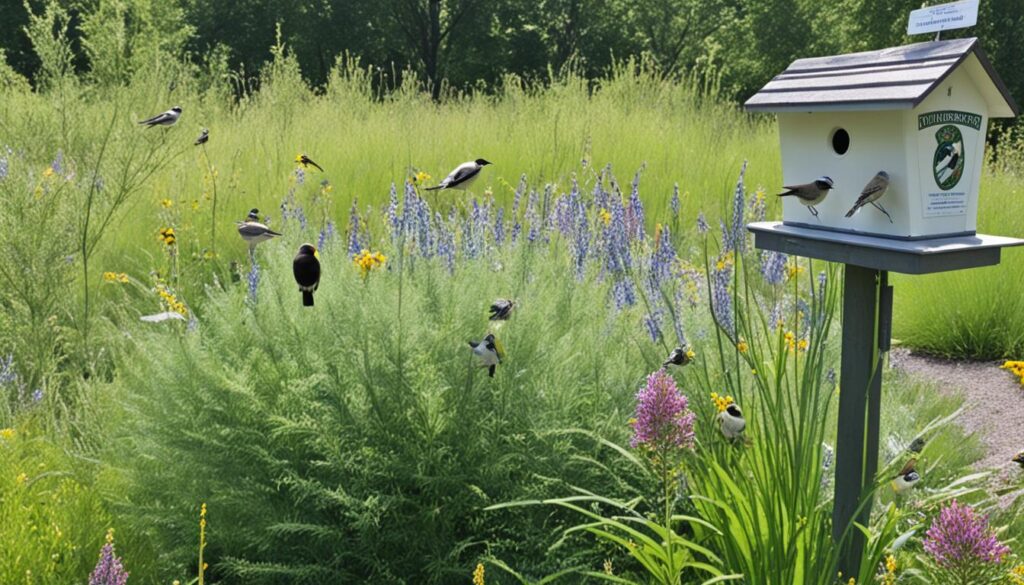
“Integrating natural pest control methods and avoiding pesticides is crucial for creating a thriving, bird-friendly backyard ecosystem that can effectively manage tick populations.”
The Surprising Ally: Opossums and Tick Control
Birds get a lot of credit for eating ticks, but opossums are also great at it. These night creatures can eat up to 5,000 ticks each season. They are a key part of fighting ticks.
Opossums are special because they don’t get Lyme disease from infected ticks. This makes them a great choice for tick control. By letting opossums into your yard, you can help fight ticks and lower the risk of getting sick from them.
“A peer-reviewed study in 2021 found that a sample of Virginia opossums from the wild had not consumed any ticks.”
This might surprise you, but opossums are really good at keeping ticks away. Adding them to your pest control plan makes your yard healthier. It helps keep ticks under control in a natural way.
Using different animals like birds, rodents, insects, and amphibians helps fight pests naturally. Opossums and others can help you avoid harmful chemicals. This way, you can have a yard that’s safe from ticks and healthy for everyone.
Chickens and Ducks: Domestic Tick Eaters
Chickens and ducks can help control ticks in your yard. They hunt and eat ticks when they are allowed to forage outdoors. Chickens are great at controlling ticks by roaming freely and eating them in grassy areas.
Choosing the Right Breeds for Tick Control
When picking chicken or duck breeds for tick control, look for those that forage well and eat insects. Heritage chicken breeds and Khaki Campbell ducks are good choices. They naturally eat ticks and can lower the tick count in your yard.
Guineafowl are also great at controlling ticks. They move in groups in grassy areas and eat a lot of ticks. In fact, they might be even better than chickens at controlling ticks because they work together and eat a lot of them.
It’s important to manage your yard well for chickens, guineafowl, and other birds to eat ticks. Keeping your yard tidy and cutting back overgrown plants makes it less welcoming for ticks. This lets these birds do their job better.
“Chickens, guinea fowl, quails, and wild turkeys are effective natural tick exterminators.”
Chickens and ducks offer more than just tick control. They give you eggs, improve the soil, and protect against predators. Adding these birds to your yard can make it healthier and free of ticks.
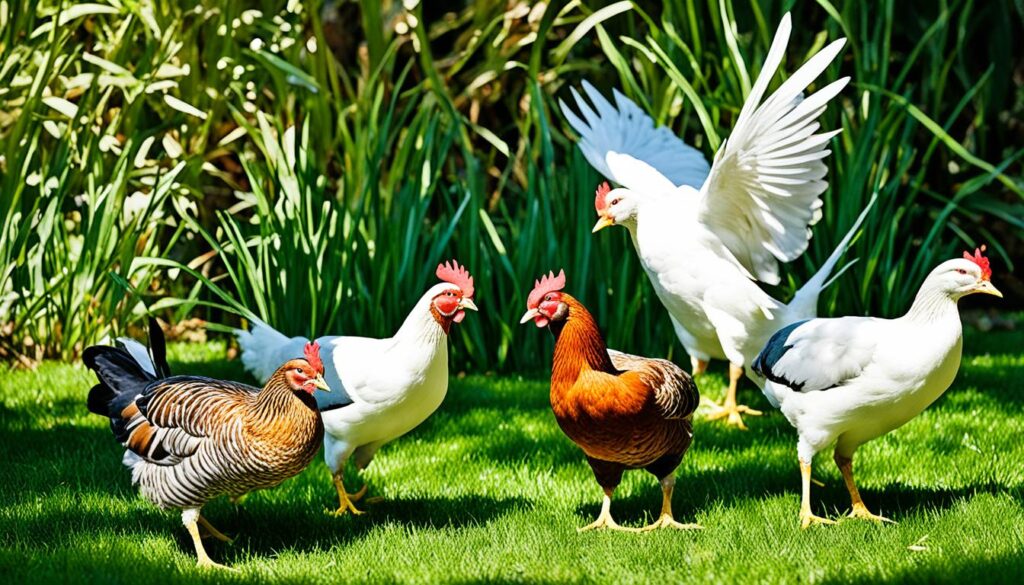
Landscaping to Deter Ticks
Using birds and wildlife to eat ticks is a good start. But, you can also use landscaping to keep ticks away. Some plants naturally repel ticks because of their smell, feel, and oils.
Tick-Repelling Plants and Their Benefits
Adding tick-repelling plants like garlic, sage, mint, lavender, beautyberry, rosemary, and marigolds to your yard can help. These plants create a barrier around areas like decks and walkways. This stops ticks from coming into your outdoor areas.
These plants also help manage tick populations. They make your landscaping healthier and more balanced.
Keeping your yard tidy can also keep ticks away. Remove brush piles, overgrown plants, and tall grass. These areas are perfect for ticks because they are moist and shady.
Using gravel or stone for pathways instead of dense plants can also help. This makes the area drier and less welcoming for ticks.
“Ticks thrive in moist, shaded areas; removing brush piles, overgrown plants, and long grass can help eliminate tick habitats.”
By using landscaping and natural pest control together, you can make your outdoor space safe and beautiful. This is good for your family and pets.
What Birds Eat Ticks?
Birds like guinea fowl, wild turkeys, chickens, robins, thrushes, wrens, and woodpeckers eat ticks. But, there are more birds that help control these pests. Knowing which birds eat ticks is key for homeowners wanting a tick-free yard.
Avian Tick Predators
Jays, bluebirds, and other ground-foraging birds also eat ticks. They actively hunt and eat these pests. This makes them great helpers in fighting tick-borne diseases.
Silvereyes eat various insects, including ticks. White-throated Treecreepers and Spotted Pardalotes also eat ticks. Superb Fairywrens, Striated Thornbills, and Brown Thornbills add ticks to their diet too.
“Attracting a diverse array of tick-eating birds to your yard can significantly reduce the presence of these disease-carrying pests.”
By drawing these birds to your yard, you can use nature’s pest control. This makes your environment healthier and more sustainable.
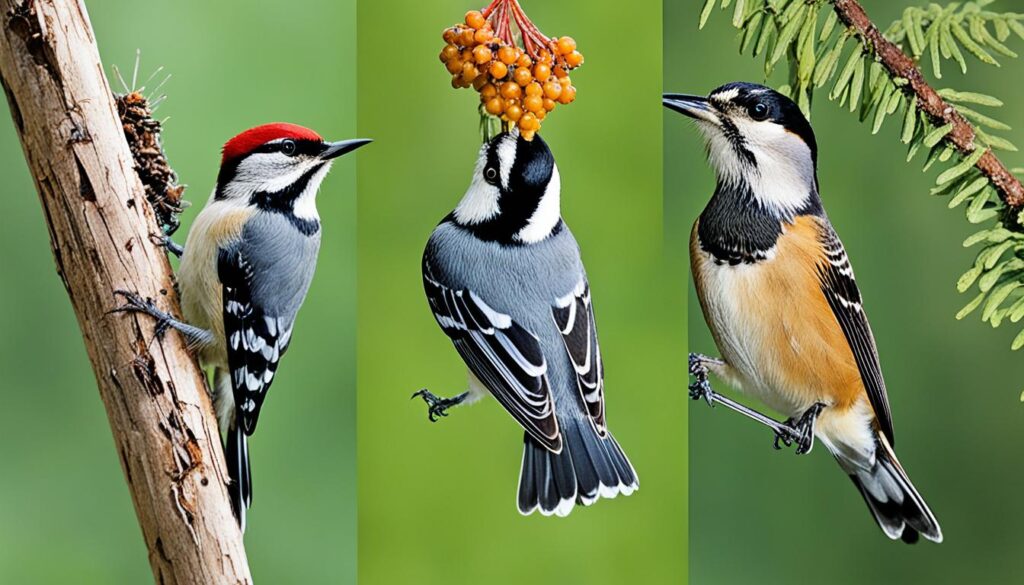
- Silvereyes
- White-throated Treecreepers
- Spotted Pardalotes
- Superb Fairywrens
- Striated Thornbills
- Brown Thornbills
Planting native plants that attract these birds helps. Avoiding pesticides creates a healthy ecosystem. This way, ticks are naturally kept under control by birds.
Personal Tick Repellents and Diet Changes
Controlling ticks can be done by making yourself less appealing to them. Eating more garlic, onions, and foods with vitamin can change your body chemistry. This makes you less attractive to ticks. Also, using essential oils like rosemary, cedar, and lemongrass can help repel ticks when applied to your skin or clothes.
Before using a natural tick repellent, the individual would pull many ticks off their dog and sometimes themselves. They live in an area with the most Lyme Disease cases in the country. Since using the repellent with Rose Geranium oil, they’ve found zero ticks for over 6 years.
The individual and their dog go on daily hikes and swim in creeks, making them more likely to encounter ticks. The homemade bug repellent oil worked well for the individual, showing its effectiveness against various bugs. Getting Lyme Disease with their dog two summers ago highlighted the importance of using personal tick repellents in high-risk areas.
By eating differently and using natural tick control methods, people can lower their risk of getting tick-borne illnesses. This way, they can enjoy the outdoors without worrying.
Integrating Multiple Tick Control Methods
To control ticks and lower the risk of diseases, a holistic approach is essential. Using different strategies together helps homeowners tackle the problem from many sides.
A Holistic Approach for Optimal Results
The best way to fight ticks is by using several methods. These include:
- Attracting tick-eating birds, such as guinea fowl and wild turkeys, to your yard
- Encouraging the presence of beneficial wildlife like opossums, which are natural tick predators
- Incorporating tick-repelling plants in your landscaping design
- Employing personal tick repellents and making dietary changes to deter ticks
By using these integrated tick control, holistic approach, and natural pest management methods, homeowners can fight ticks from all angles. This strategy ensures lasting and safe tick control in your yard and nearby areas.
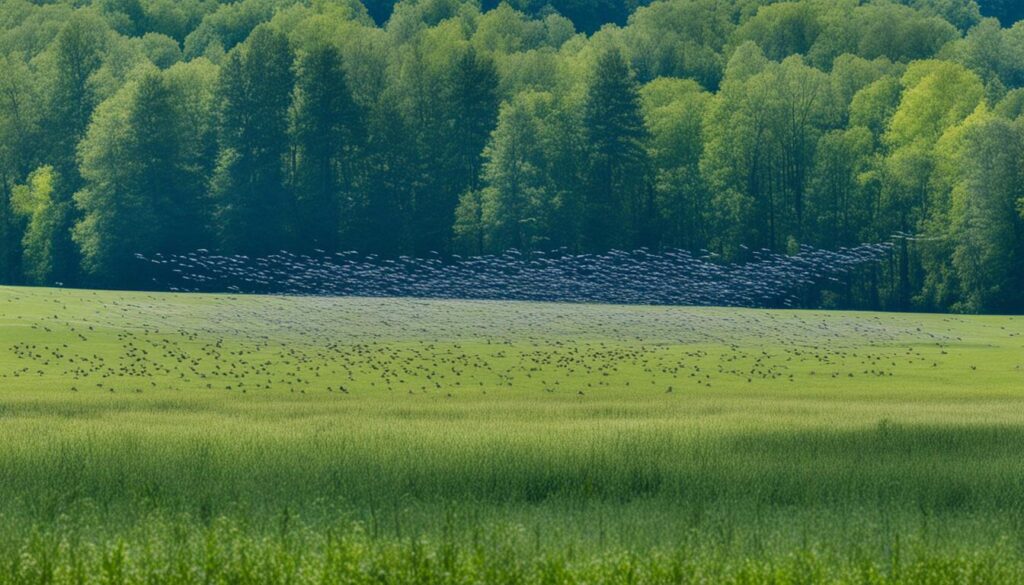
“A single method of tick control is unlikely to provide sufficient suppression of tick abundance or pathogen prevalence to prevent human disease. A multi-faceted approach is necessary for optimal results.”
Combining different strategies not only boosts effectiveness but also cuts down on harmful chemicals. This holistic approach leads to a more natural pest management system. It’s good for the environment and human health.
Benefits of Natural Tick Control with Birds
Using birds and other natural predators to fight ticks has many benefits of natural tick control. These environmental benefits and health advantages show why natural methods beat chemical pesticides.
One big environmental benefit is the lack of harmful toxins in nature. Chemicals can harm wildlife and pollinators. But, natural ways like having birds that eat ticks keep nature in balance. This also means less exposure to dangerous substances, which is good for health advantages for people and pets.
A Healthier, More Sustainable Backyard
Choosing natural tick control leads to a healthier, sustainable backyard. By welcoming birds and other predators, homeowners can control ticks and help the local ecosystem. This approach makes the outdoor space safer and more lively for families.
“Attracting birds to your yard is a fantastic way to naturally control ticks and protect your family’s health. It’s a win-win for the environment and your well-being.”
Going for natural tick control means helping the planet and your health. By using birds and other natural predators, you cut down on harmful chemicals. This makes your backyard a place full of diverse wildlife.
Resources for Attracting Tick-Eating Birds
Homeowners looking to fight ticks can use birds to their advantage. Making your yard bird-friendly is crucial. This attracts birds that eat ticks and live in your yard.
It’s important to know how to make a safe home for birds. This includes building nests and offering water for different bird types. Also, planting native plants helps the local birds and your bird-friendly landscaping.
- Building and placing birdhouses helps birds find shelter. This makes your yard a better place for them.
- Feeding birds with good birdseed and suet encourages them to stay. This helps with tick control in your yard.
Using these resources for attracting birds creates a great place for birds to live. This helps with tick control in your yard. It’s good for the environment and keeps your family safe.

“Attracting birds to your yard is a win-win for both you and the environment. Not only do they bring beauty and song, but they also serve as natural pest control by devouring ticks and other unwanted insects.”
Conclusion
Using birds and wildlife to eat ticks is a great way to fight against these pests. By knowing which birds, like guinea fowl and wild turkeys, eat ticks, we can help control their numbers. This method is good for the environment and keeps us safe from tick-borne diseases.
Adding different natural ways to control ticks, like having birds like robins and thrushes in our yards, works well. Even opossums can help by eating ticks. This approach not only keeps ticks away but also makes our yards healthier and more balanced.
By using birds to control ticks and combining it with other pest management methods, we can have a tick-free yard. This helps our local ecosystems stay healthy and diverse. The article shows how birds and wildlife are key in fighting ticks and diseases.
FAQ
What birds are known to eat ticks?
Birds like guinea fowl, wild turkeys, chickens, robins, thrushes, wrens, and woodpeckers eat ticks. They help control tick populations and prevent diseases.
How can birds help control tick populations?
Birds hunt and eat ticks naturally. By having these birds in your yard, you can reduce ticks. This helps keep your home safer.
What are some common backyard birds that help control ticks?
Robins and thrushes eat ticks while searching for food. These birds can be encouraged to visit your yard. This can lower tick numbers.
How can I create a backyard environment that attracts tick-eating birds?
To attract these birds, add trees, shrubs, and a water source. Avoid pesticides to protect beneficial insects and the birds that eat them.
Are there any other natural allies in the fight against ticks?
Opossums are also great at eating ticks. One opossum can eat up to 5,000 ticks each season.
Can domestic birds like chickens and ducks help control ticks?
Yes, chickens and ducks can eat ticks when allowed outside. Choose breeds that like to forage and eat insects.
Are there any plants that can help deter ticks?
Plants like garlic, sage, mint, lavender, beautyberry, rosemary, and marigolds can keep ticks away. They make your yard less inviting to ticks.
Are there any personal measures I can take to make myself less attractive to ticks?
Eating more garlic, onions, and foods with vitamin B1 can make you less appealing to ticks. Natural essential oil-based repellents can also help.
What is the best approach to effectively control ticks in my yard?
Use a mix of methods for the best tick control. Attract birds, encourage wildlife like opossums, use tick-repelling plants, and apply personal repellents. This approach gives you the best results and lowers disease risks.
